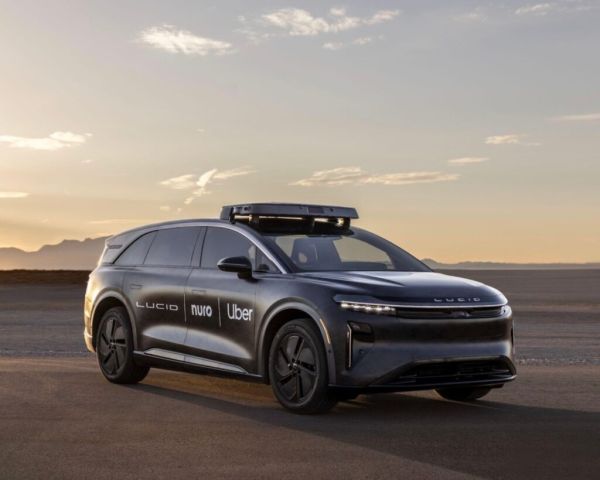
Uber is investing hundreds of millions of dollars into EV maker Lucid and autonomous vehicle technology startup Nuro in a bid to launch its own premium robotaxi service.
Under the deal announced Thursday, Uber will invest $300 million in Lucid and separately buy “at least” 20,000 of the EV maker’s new Gravity SUV over the next six years. Those EVs will be equipped with Nuro’s autonomous vehicle system, and the vehicles will be owned and operated by Uber or its third-party fleet partners. Uber plans to launch a robotaxi service in a major U.S. city next year.
Production of these modified Lucid Gravity vehicles is expected to begin in late 2026, according to a regulatory filing.
Uber is also investing an undisclosed “multi-hundred-million dollar” amount into Nuro. One source familiar with the agreement said the amount is more than Uber’s investment in Lucid.
The agreement between the three companies was a year in the making, Nuro co-founder and president Dave Ferguson told Read.
“I think that’s probably a reflection of how meaty it is,” he said, adding that Uber was looking to make a very large commitment to a robotaxi program, and spent time with almost every AV company to find the most suitable partner.
“We were thrilled that, at the end of all that, we were the partner that was chosen,” he said.
Techcrunch event
San Francisco
|
October 27-29, 2025
Ferguson said engineers at Lucid and Nuro have already made progress on the project. The companies have been testing a prototype driverless vehicle on a closed track at Nuro’s proving grounds in Las Vegas.
Lucid Gravity SUVs are ideal because the vehicles are already equipped with kind of hardware redundancies required for a Level 3 automated driving system, Ferguson said. Level 3 is a designation by the Society of Automobile Engineers that allows the driver to take their eyes off the road and hands off the wheel in certain conditions.
The Nuro-equipped Gravity vehicles will be Level 4, which means the vehicle can handle all aspects of driving in certain conditions without human intervention. Still, the added redundancies made it “almost a delight” as Nuro integrated its self-driving system into the vehicles, he said.
Uber has spent the past two years locking in partnerships with autonomous vehicle technology companies, covering the spectrum of how self-driving systems can be applied to the physical world. The ride-hailing giant has partnered with more than 18 companies globally, across ride-hailing, delivery, and trucking. Just this year alone, it announced deals with Ann Arbor, Michigan-based May Mobility Volkswagen, as well as Chinese self-driving firms Momenta, WeRide, and Baidu.
Uber’s most high-profile partnership in the U.S. — and one that is commercially operating today — is with Waymo. The companies offer a “Waymo on Uber” service in Austin and Atlanta.
This deal illustrates just how much money Uber is willing to invest in hopes of tapping into, and even dominating, the burgeoning autonomous vehicle market.
The agreement is also a validation for Nuro, a startup that has raised more than $2 billion from high-profile investors since its founded in 2016. Nuro initially focused on applying its AV tech to a fleet of low-speed, on-road delivery bots, which it had developed. The company burned through cash and after facing tightening capital markets, went through multiple rounds of layoffs in 2022 and 2023.
Last year, Nuro pivoted its business strategy to focus more on the startup’s core autonomous driving technology. It ditched the low speed delivery model and set out to license its autonomous vehicle technology to automakers and mobility providers, like ride-hail and delivery companies. The decision to just focus on developing and licensing the AV system allowed Nuro to extend its runway from 1.5 years to 3.5 years, the company said at the time.
But the company still needed a licensing deal to prove out its shift. The Uber agreement, along with several others that are in the works, according to Ferguson, suggests the pivot is paying off.